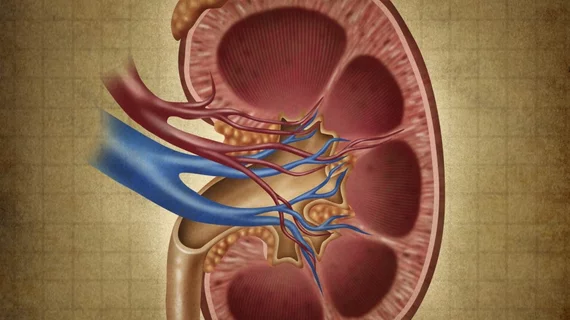UFR-guided hydration minimizes contrast-induced complications in CKD patients
Urine flow rate-guided (UFR) hydration, as opposed to left ventricular end-diastolic pressure-guided (LVEDP) hydration, could prevent more complications in chronic kidney disease (CKD) patients who are at a high risk for contrast-induced kidney injury, researchers reported at TCT 2019 in San Francisco.
Findings from the REMEDIAL III randomized trial, first presented at the end of September, suggest a UFR-guided technique might yield more favorable results than LVEDP hydration in CKD patients who are prone to acute kidney injury following the administration of contrast dyes in diagnostic and interventional procedures. Such patients are at a higher risk for complications like pulmonary edema—a serious condition that can result in respiratory failure.
Study author Carlo Briguori, MD, PhD, and colleagues enrolled 708 patients for REMEDIAL III, all of whom exhibited one or a combo of the following: an estimated glomerular filtration rate of less than 45 mL/min/1.72 m2; a Mehran’s score greater than or equal to 11; or a Gurm’s score greater than 7. Patients were randomized 1:1 to LVEDP-guided hydration with normal saline (355 patients) or UFR-guided hydration controlled by the RenalGuard system (353 patients). In each case, the low-osmolar, non-ionic contrast agent iobitridol was administered.
Five-point-seven percent of patients in the UFR-guided group and 10.3% of patients in the LVEDP-guided group met the study’s primary endpoint of contrast-induced acute kidney injury and/or acute pulmonary edema. For the purposes of the study, acute kidney injury was defined as a serum creatinine increase of greater than or equal to 0.5 mg/dL from baseline to 48 hours.
The number needed to treat to prevent one event with the RenalGuard system was 22.
“Acute kidney injury can be a serious complication due to the contrast received during invasive diagnostic or interventional procedures,” Briguori, chief of the Laboratory of Interventional Cardiology at the Mediterranean Cardiocentro in Naples, Italy, said in a statement. “Hydration is the cornerstone to prevent this complication. However, uncontrolled hydration may lead to acute pulmonary edema.
“The REMEDIAL III trial compared two tailored hydration regimens to reduce these risks as a whole in high-risk patients. The study found that UFR-guided hydration is superior to LVEDP-guided hydration to prevent acute kidney injury and acute pulmonary edema.”

